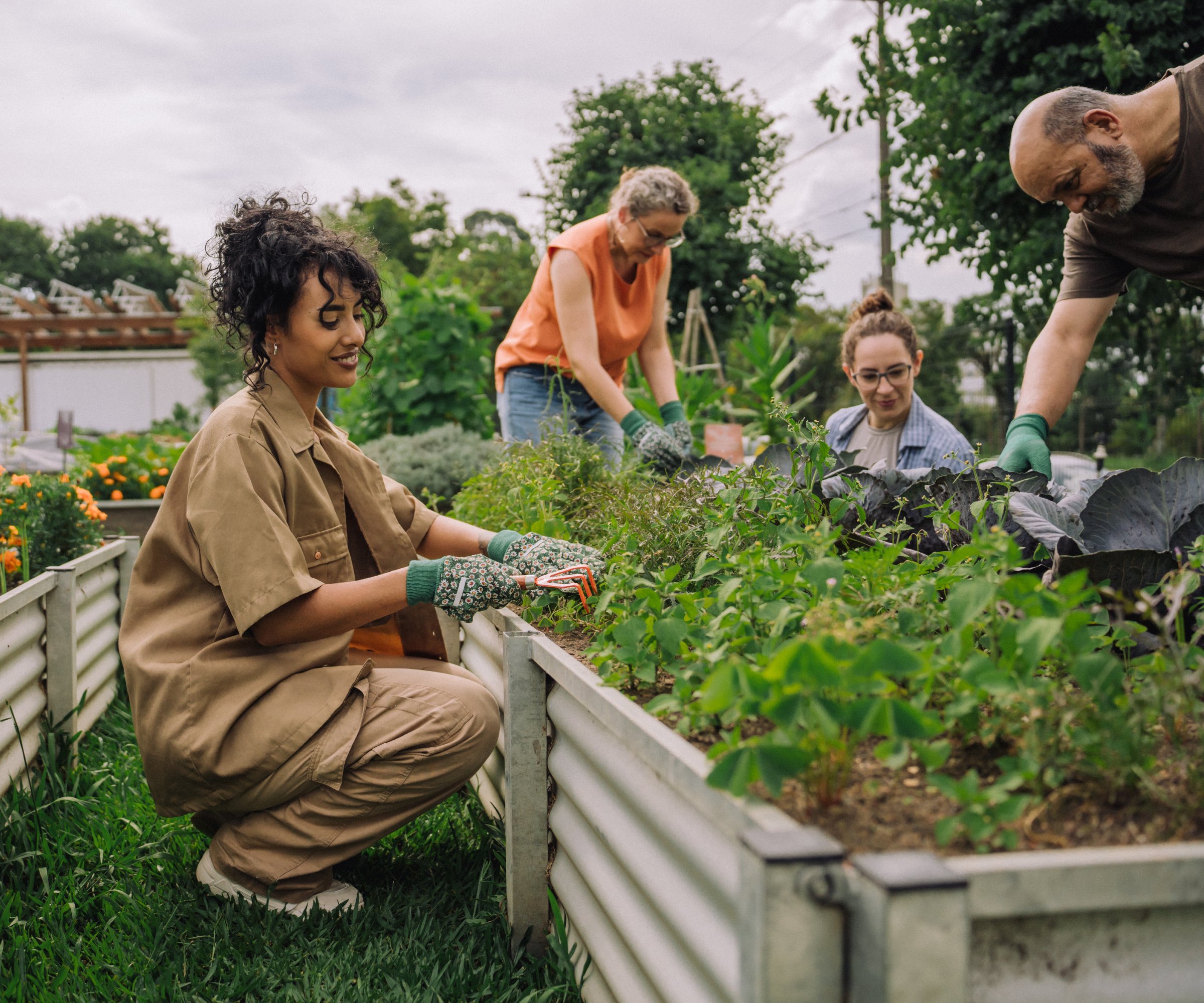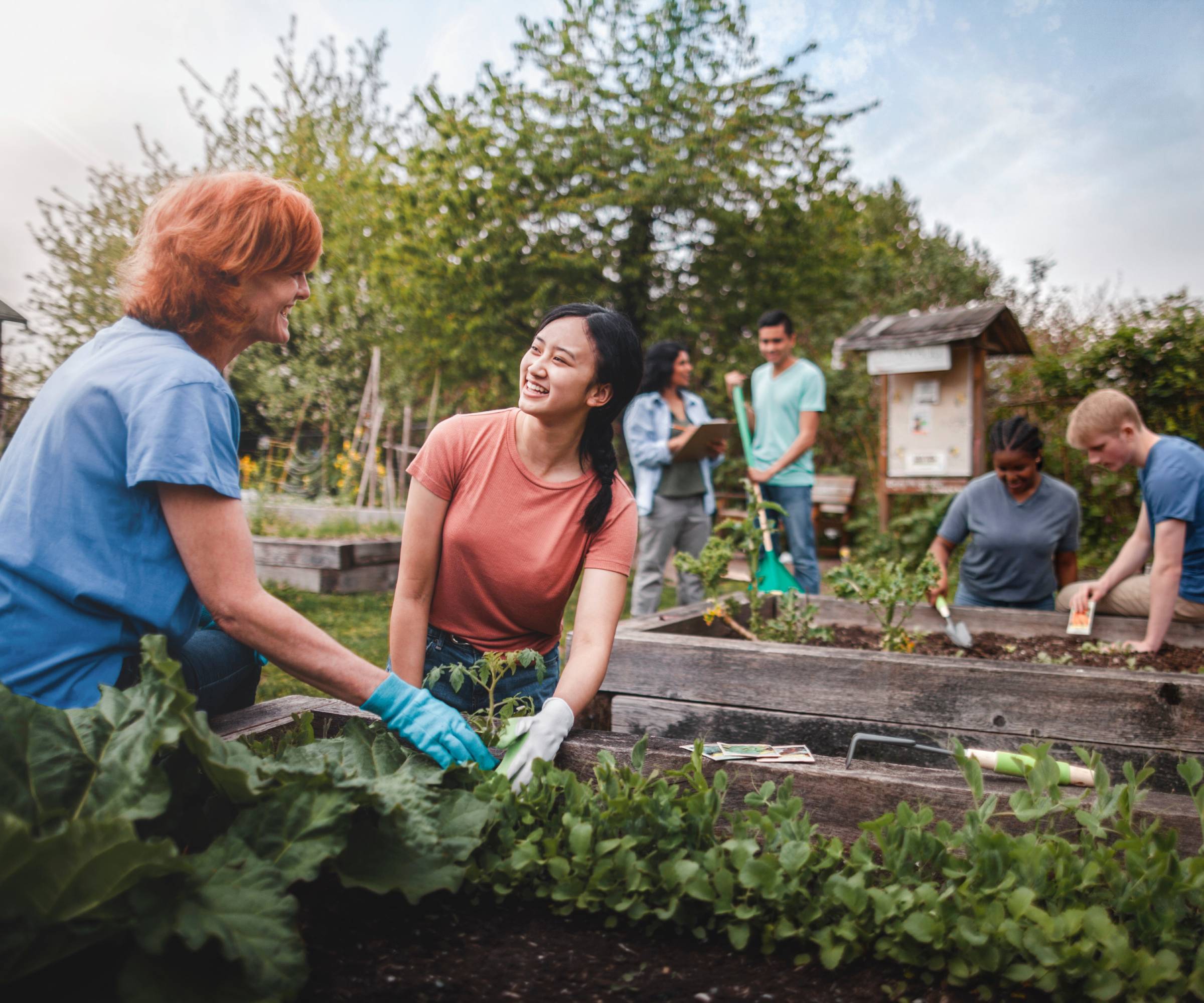Dig Into The Pros & Cons Of Community Gardening: 2 Experts Share Their Opinions
Two gardening experts examine the pros and cons of community gardening. Discover the top reasons why (or why not) to start growing in community.

Sign up for the Gardening Know How newsletter today and receive a free copy of our e-book "How to Grow Delicious Tomatoes".
You are now subscribed
Your newsletter sign-up was successful
Farm to table is a popular philosophy and nowhere is it more finely practiced than in the community garden. Community gardens imbue us with a sense of sharing, sustainability and encourage smart space usage. In fact, a community garden is a phenomenon that is widely embraced by many, and for good reason.
The benefits of community gardening not only enrich each individual gardener but the surrounding community as a whole. But they also have the capacity to reveal the dark side of your neighbors, opening us up to bad practices like unfair division of labor, theft, and vandalism. Most of the pitfalls of community gardens are minor but, occasionally, they overwhelm the entire concept of the project.
This is why it's a good idea to know the community gardening downsides before committing to a local space. Here you will find both views on the pros and the cons of community gardening.
Pros of Community Gardening
Shelley's viewpoint: Let's examine the positive effects of community gardens. I'm sure you'll be inspired to sign up for a plot in your local community garden or even to initiate a community garden in your own neighborhood.
Accessible to all. The opportunity to grow food should be made available to everyone. If you don't live out in the country, chances are you aren't situated on a lot of open land, if any at all. With the advent of community gardens, the opportunity to garden was extended to more people who previously did not have the option available to them.
Source of fresh food. Equal opportunity in relation to community gardens is immensely satisfying, rewarding and significant for many reasons. The accessibility to fresh food for some may be limited due to barriers such as affordability.
The higher cost of fresh grocery store produce compared to that which is home grown is irrefutable. Also, a community garden may be the closest, and perhaps the only, source of fresh food available to a gardener with a limited means of transportation and mobility. These are just one of many community garden advantages.
Sign up for the Gardening Know How newsletter today and receive a free copy of our e-book "How to Grow Delicious Tomatoes".

Reduces crime. Let community gardens fill seedy places with seeds! All neighborhoods have vacant lots. And, as we all know, sometimes bad things start happening in good, but otherwise empty spaces. This is where the benefits of community gardening can really be seen. In fact, community gardens actually lower crime rates. Yet another of the many pros of having a community garden.
Increases value. There are also economic benefits of community gardens. Shared green spaces, like community gardens, can increase surrounding property values and encourage higher rates of home ownership. Growing your own food also helps you save money on fresh produce. Community gardens can also bring fresh, healthy food to underserved areas like food deserts.
Community gardens = healthier communities. The positive effects of community gardens can be felt as gardening is not only a venture that feeds and rejuvenates the body but also one which nurtures the mind and is just as important as a local fitness or community health center. Community gardening benefits your body and mind.
Your state of mental health could also be given a positive boost because gardening is a stress-reducing, relaxing activity. It is even backed by scientific studies. When gardening, you interact with soil antidepressant microbes that make you happier and healthier.
Also, there is research that suggests community gardeners are inclined to eat more fruits and veggies. This, again, ties into the concept of accessibility, and there is just something more satisfying about enjoying the fruits of your own labor. Let's face it, homegrown simply tastes better than store bought! It is fresher, so you're apt to eat more too.
Community gardens build community. That's why they're called community gardens. These shared third places help people literally and figuratively find common ground. They bring people of different ages and backgrounds together in one place with one common interest. In these uncertain times, anything that brings people together and unites them in a positive way is a good thing.
Cons of Community Gardening
Bonnie's viewpoint: While the idea of a community garden is a generous one, some of the realities behind such gardens are rather uncomfortable. Considering the cons of urban agriculture can help you decide if you want to be involved in such activities. Below are some examples:
Conflicts. Personality clashes are among the problems with community gardens. When people work closely together there are bound to be differences of opinion, jealousy, and other negative effects. Small conflicts can be exacerbated by cultural differences.
Many community gardens are sited in areas with a wide array of different cultural backgrounds. Not everyone is going to agree to the same rules and this can lead to arguments or even physical confrontations.

Harvest issues. You need to consider what you will reap and how much you can lose. In most cases, individual gardeners or organizations will harvest their own produce, which is used in homes or as part of a community outreach food project.
However, there are those who want the produce for themselves and will stoop to stealing your perfect tomatoes or big, bountiful peonies in the night. Theft of tools is also common as is vandalism. Community gardens can also attract attention from malicious taggers and other vandals.
Competition for resources. Neighborhood groups say one of the primary problems with community gardens is the potential to transform an area, changing the character and flavor of a neighborhood, while decreasing garden space use for underprivileged gardeners.
Additionally, a tug of war among non-profits to access grants, donations, and local business sponsorships is a community garden downside. Such competition for scarce resources may diminish each project, leaving them without adequate resources due to demand.
So Is Community Gardening a Good Idea?
For the most part, community gardens operate in the manner in which they are intended, as a civic service that is free and open to all who participate. But just as it takes only one bad apple to spoil the barrel, a significant flurry of negative experiences can put a sour taste in one's mouth. Almost anything can be tolerated if the benefit outweighs the risk.
In community gardening, the harvest, both in food and positive experience, should be great enough to balance any potential problems and negative outcomes. And, as you can see, there are many pros of having a community garden that far outweigh any cons.
To discover even more reasons why you should start or join a community garden, check out our free online course Community Gardening For Everyone. You'll hear gardeners from across the country share amazing stories and experiences that have transformed their lives, all because of their own local community gardens. So what are you waiting for? Join a community garden today!

Bonnie Grant is a professional landscaper with a Certification in Urban Gardening. She has been gardening and writing for 15 years. A former professional chef, she has a passion for edible landscaping.

